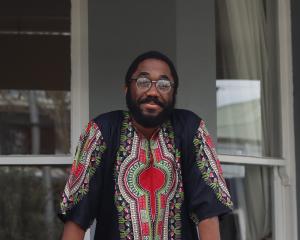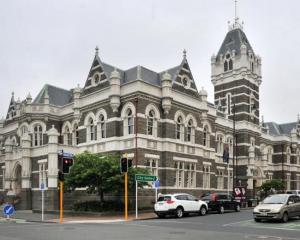
A representation review team has proposed changes to Dunedin local body representation. Craig Borley asks Dunedin city councillors these questions. 1. Should all councillors be elected ''at large''? 2. Are the proposed community board changes appropriate?
Some Dunedin city councillors fear the city's unique rural voice could be in jeopardy under proposed changes to its local government representation rules.
Several proposed changes were released by the representation review team on Wednesday, and will be discussed by the council on Monday.
Councillors were almost unanimous in supporting the proposal that the number of councillors remain at 14 plus an elected mayor.
David Benson-Pope felt 12 was a better number, Hilary Calvert said as it stood 14 was ''too many people to get together in a room'' and Kate Wilson was unsure.
But while the majority were in favour of all councillors being ''elected at large'', some felt the diversity of the current council could be lost if Dunedin's two smaller wards were abolished.
At present, two councillors are elected to represent the Mosgiel Taieri Ward and one is elected to represent the Waikouaiti Coast-Chalmers Ward.
The other 11 councillors are elected to the Central Ward.
In the Waikouaiti Coast-Chalmers Ward, only Andrew Noone stood for council in 2013, meaning residents had no chance to vote for any other councillors.
Conversely, more than 30 people stood for the 11 available Central Ward positions.
Proposed changes to community boards were approved by most councillors, although some feared reducing the number of board members from six to four would stretch people too thinly.
John Bezett
1: Yes. Currently, once elections were over councillors were oath-bound to vote for the whole of the city's interests anyway.
2: Yes. As long as council ''got the balance right''. It was important Dunedin's rural communities got their representation through the rural community board.
David Benson-Pope
1: Yes. It was a logical decision, and the electorate was in control of ensuring a good cross-section of people was elected.
2: Yes. The proposals were ''sensible'', and the city's more remote areas needed community boards.
Neville Peat
1: Unsure. A fear was rural representation could suffer, while the sheer number of candidates in a one-ward system could overwhelm voters.
2: Yes and no. Cr Peat understood the boundary changes, although needed more convincing on the sheer size of the rural ward. He was unhappy with reducing the number of board members from six to four, as the current six were ''kept pretty darn busy'' already.
Andrew Whiley
1: Yes. However, he noted the smaller wards' elected councillors had provided ''outstanding'' service to their communities.
2: No. He said he was ''gutted'' about the proposed changes, particularly dropping board-member numbers to four, and said community boards had proven their worth over the past week.
Jinty MacTavish
1: Unsure. She saw positives and negatives with the proposal, but was nervous of the implications a city-wide election campaign might have for some candidates.
''I would hate us to become a city where only those who have substantial financial means are able to run for council.''
2: Unsure. She said that was something the council needed to hear back about from the community.
Aaron Hawkins
Could not be reached for comment.
Chris Staynes
1: Yes. However, he had some concerns a ''pure rural'' candidate could struggle to get elected under the proposed model, though a well-known candidate standing for rural issues could solve that problem.
2: Yes. He saw value in community boards representing populations significantly different from metro Dunedin.
Doug Hall
1: Yes. Mr Hall said it was too hard for ward-based councillors to put city-wide interests above ward interests.
2: Yes.
Hilary Calvert
1: Yes. She cited people in Waikouaiti who had felt they had not had an election in 2013, while it was hard for ward-elected councillors to put city-wide interests above ward interests.
2: Yes. She liked the rural ward idea, and would extend it further to have a rural board cover all rural matters across Dunedin.
Richard Thomson
1: Yes. He was aware many people felt disenfranchised being in one of the smaller wards in 2013.
2: Yes. He was in favour of reducing board member numbers from six to four, though was more open-minded as to the amalgamation of boards and boundaries.
Lee Vandervis
Could not be reached for comment.
Mike Lord
1: Neutral. He understood people feared a reduction in rural representation. However, he thought it was up to the electorate to ensure that didn't happen.
2: Unsure. He said smaller and rural communities did need representation.
Kate Wilson
1: Unsure. She understood some people's frustration at not having a part in elections, but was concerned over the ability of ''quiet achievers'' to be seen and known city-wide.
2: Unsure. She liked the shared-interest argument associated with the proposed rural ward, but was concerned at its sheer size, and the ability to have board members who knew all its ''nooks and crannies''.
Andrew Noone
1: No. He believed the proposal could ''urbanise'' the council. He also feared potential candidates wanting to represent more isolated areas would need to fund city-wide campaigns to get elected, and that would prove too costly for many.
2: No. He said it left too much reliance on community boards providing a rural voice, which would never be as effective as a vote around the council table.
Mayor Dave Cull was part of the representation review team, and said while it was inappropriate for him to comment on specific details, it could be assumed he was in favour of the proposal.












